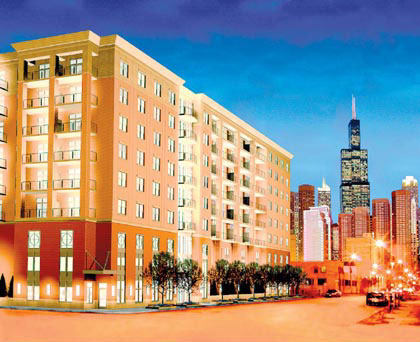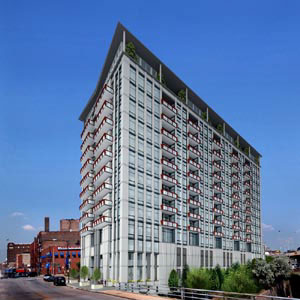Bargains abound as developers court buyers in competitive market
 What will it take to put you in a new home today?
What will it take to put you in a new home today?
Whatever your answer, the odds have never been greater that there’s a developer out there willing to meet you more than half way. Facing a crowded, highly competitive market for new homes in Chicago, builders have taken a page from used car dealers, rolling out splashy sales incentives and bargaining with buyers on perks and prices.
You like granite countertops? Sure, we’ll throw those in, no charge. Hardwood floors, stainless steel appliances? Done. Still not interested? What say we give you one of those parking spots we normally sell for $30,000 a pop?
Real estate advertisements these days are full of hot deals designed to create a sense of urgency for buyers. In July, Sussex & Reilly promoted a “48-hour sale” that promised up to $10,000 off the purchase price on selected units and up to $20,000 in free upgrades at 6030 N. Sheridan, a condo conversion in Edgewater. Along with a host of other developments, Jefferson Tower, the Grand Orleans, Skybridge and State Place are giving away free parking spots, valued at anywhere from $25,000 to more than $35,000, with the purchase of a new condo.
At press time, Dubin Residential was offering a special “rate lock” program at its developments. Buyers can lock in today’s interest rates for up to 12 months, even if they won’t close until some time next year. Dubin pays the fees associated with the program, which is designed to give buyers a sense of security at a time when interest rates are rising.
“We suspect that there are a lot of first-time buyers who can afford to buy a home today, but who may be afraid they could not buy the home 10 or 12 months from now if interest rates went up significantly,” says Dubin’s Mike Kelehan. “We want to offer a comfort zone to these buyers…”
Conversion Marketing and Management, Inc. is offering an 18-month rate lock program at the Edge Lofts and Tower, and MR Properties has a similar deal at 950 W. Monroe.
Free parking and free upgrades are the most popular incentives, although developers also are offering special financing deals, lower deposits when contracts are signed and in some cases, price discounts. Other deals have been more creative. American Invsco generated traffic at several developments by offering no payments (mortgage, taxes and assessments) for a number of months. At press time, the developer was structuring a new incentives package but details were not yet available.
 The biggest incentives tend to come early in the life of a development, before a project has broken ground, or late, when buyers have moved into a building where units are still for sale. Developers use perks early on to help meet their “presale requirement,” the number of units lenders want sold before a project is deemed viable and can break ground. They also turn to incentives as “closeout specials” to sell the last available units in a building, so that they can avoid expensive carrying costs and move on to the next project.
The biggest incentives tend to come early in the life of a development, before a project has broken ground, or late, when buyers have moved into a building where units are still for sale. Developers use perks early on to help meet their “presale requirement,” the number of units lenders want sold before a project is deemed viable and can break ground. They also turn to incentives as “closeout specials” to sell the last available units in a building, so that they can avoid expensive carrying costs and move on to the next project.
Some developers have set incentives that they advertise loudly, but many keep the deals hush-hush until they have serious buyers in their sales centers. The process of buying a new home has more become more like buying a used car than many builders want consumers to know. On an individual basis, buyers often are able to negotiate free upgrades or price discounts with sales agents eager to deal.
“We survey everyone about concessions, and there are people who tell us what’s advertised but then there are those who tell us what’s not advertised, the point-of-purchase concessions they’re offering,” says Gail Lissner, of housing analyst Appraisal Research Counselors. “There’s probably a little more wiggle room than there used to be.”
Sales of new homes were brisk in the first quarter, with contracts signed on more than 890 units in central Chicago, according to Appraisal Research, so why are developers willing to give away so much?
A massive number of new homes came to market in Chicago at the end of the ’90s, with more than 6,000 new units announced in 1999 and close to 5,000 announced during each of the next two years. The pipeline was bursting with new homes at a time when sales began to slow. Builders who were used to selling out projects before the first move-ins found themselves holding onto units long after buildings were completed.
Developers turned to incentives as a quick way to generate traffic at sales centers, and once a few began offering such deals, others had to follow suit. Sales incentives have since gained some momentum of their own as buyers have come to expect these deals.
The problem of oversupply eased during 2003, and fewer new projects were announced. Developers instead focused on selling off their existing inventory in a year of massive deliveries, but 2004 has seen a raft of new developments. At least some of the recent boost in sales is probably the short-term result of rising interest rates, and in today’s highly competitive market, builders are not likely to do away with concessions anytime soon.
“The market’s pretty used to (incentives) right now,” Lissner says. “That will change over time, but there has been a lot of new product this year, so we expect them to linger for a while longer.”
Incentives certainly were on the rise during 2004. A quick survey by New Homes found nearly 20 developments advertising free or discounted parking at press time. A free parking spot, which usually ranges between $25,000 and $35,000, is a much pricier perk for developers than free upgrades. The fact that free parking may have replaced free upgrades as the most popular of the advertised deals is a sign of how competitive the current market has become.
Some developers and brokers, however say that the right incentive can be worth the cost.
“Everybody likes a deal, everyone wants to feel like they’re getting something special,” says Arsiak Raffaelli, a Sussex & Reilly sales agent selling condos at the 6030 N. Sheridan conversion. “Traffic does go up when we’re running incentives.”
At press time, the development, where units are priced from around $110,000 to $350,000, was 70 percent sold. The project has offered a variety of deals, including $2,500 to $10,000 toward closing costs and a package in which buyers pick two of three perks: stainless steel appliances, a year of free parking and a year of free assessments.
Ads that promise free parking, upgrades or other time-sensitive deals can create a sense of urgency among buyers, but some say there’s also a downside to incentives, which can get fairly complicated, at a time when cynical consumers bombarded by “deals” in all walks of life are wary of something for nothing.
“We shy away from those sorts of incentives because we think they’re bogus,” says Jerry Houlihan, of Sutherland Pearsall, developer of the Grand on Grand. “They offer you $20,000 in upgrades, then jack the price up. We take each buyer case by case and to get the deal done, we might offer some incentive, a washer or dryer or something like that.”
Indeed, it’s not unusual to see base prices rising at a development around the time that “free” parking or other perks are introduced.
“Certainly builders can build in some of those costs elsewhere,” Lissner says.
At some projects, including the Thrush Companies’ 740 Fulton and No. Ten Lofts, by Centrum Properties and MCZ Development, parking is simply included in the base price for all units. Buyers don’t have to figure the ins and outs of various deals, or worry that someone else is getting a perk that they’re missing. In Thrush’s case, the local alderman insisted that parking be included with each unit at 740 Fulton as a condition for approving the planned development. He was concerned that investors at some projects have been purchasing condos without parking spaces, forcing future buyers to park on the street and adding to congestion.
The potential problem with a price that includes parking, according to David Chase, CEO of the Thrush Companies, is that some buyers might not realize they’re comparing apples and oranges when looking at various projects.
“If every developer is required to sell parking with their unit, and the buying public becomes accustomed to every unit offering a base unit with parking, then it’s not an issue,” Chase says. “However, people are very price sensitive and look at the chunk price as much as anything. When one guy is priced at $249,000 and excludes parking and the other guy is $279,000 and includes parking, is there the possibility that someone might not come to my development because he thinks it’s $30,000 higher?”
Buyers should carefully consider exactly what’s included before comparing prices at various projects, Chase says, and he has some old but sage advice for them to keep tucked away.
“In terms of incentives, are they really free?” Chase says. “Of course not, nothing’s free.”
